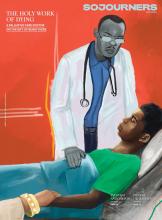SOME OF MY fondest memories of my homeland, India, are of food, family meals, and big community banquets. My culinary tastes are versatile, but I explore Indian food as often as possible. What a joy to join a table filled with chutneys, biryani, coconut shrimp curry, aloo gobi, raitas, and dal with the scents of citrus, ginger, cardamom, coriander, and cumin inviting us all. Such meals, for me, are not just an act of consuming delicious food but a means of recalling stories and images of home. Many memories are shaped around the tastes and smells of food. Those memories become part of our experiences and shape our identity. Our relationship with food operates on both primal and profound levels. Food fuels our bodies physically, but meals are also where people express themselves. People are creative in their cooking. They send a message through their food.
Food is also a metaphor for social and economic structures in our contemporary contexts as well as in the Bible. Meals are occasions where people either enact inclusion and deep care for others through table fellowship and radical hospitality, or practice exclusion and tell others they are not invited. In that way, food functions as an extension of our values, of ourselves.
From the earliest parts of the Christian story, food is central. Jesus presents himself as the bread from heaven, our liberator. He offers himself as bread — blessed, broken, and shared for the world. He feeds the hungry and enjoins us to do the same, in his name.
Read the Full Article

